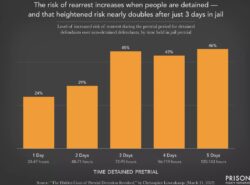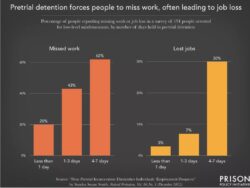Post #250
940 words; 4 minutes to read
Audio summary by volunteer Kimberly Duong.
This post is a summary of a blog post from the Prison Policy Initiative in the US: Research roundup: Evidence that a single day in jail causes immediate and long-lasting harms by Brian Nam-Sonenstein, August 6, 2024
Summary: A considerable body of research shows that pretrial detention creates serious harm for those arrested, even after only a few days, while doing little or nothing to improve public safety.
Recent research challenges the notion that pretrial detention is a necessary tool for maintaining public safety and ensuring court attendance. Instead, studies show that even a single day in jail can lead to significant and immediate harms, undermining both individual well-being and community safety. This article reviews the mounting evidence against pretrial detention, highlighting its negative effects on defendants and advocating reform. Although the research is from the US, very similar issues and results exist in Canada as well.
Negative Effects of Pretrial Detention
Pretrial detention is often justified under the premise that it prevents crime and guarantees court attendance. However, research reveals that this approach is largely counterproductive. Judges contemplate the risk a person poses to the community if released, but — crucially — not the risk detention poses to individuals and the community. Recent studies have measured pretrial detention’s impact on those detained, particularly within the first 72 hours. There is no “safe” way to jail a person, nor is there an amount of time a person can be detained without escalating short- and long-term risks to themselves and their communities. If judges considered these harms and their implications for public safety when deciding whether to initially release or detain people, far fewer people would be jailed pretrial.
For instance, a study of over 1.5 million people in Kentucky found a direct correlation between the number of days spent in pretrial detention and an increased likelihood of rearrest. The chances of being rearrested escalated significantly with each day of detention, undermining the very goals of detention (Figure 1).
Impact on Community Safety
Contrary to the belief that keeping individuals in jail deters crime, evidence shows that pretrial detention can actually make communities less safe. In jurisdictions that have implemented reforms to reduce reliance on cash bail, crime rates have remained stable or even decreased. For instance, after New Jersey eliminated cash bail in 2017, serious crime rates fell, while the rate of individuals committing new offenses during their pretrial period increased only minimally. Similar results have been found in other states.
Barriers to Court Attendance
Judges often overlook the fact that pretrial detention can create barriers to court attendance. Detained individuals frequently lose jobs, housing, and essential government benefits, making it more challenging for them to appear in court. For example, research from Kentucky indicated that those detained for just one day were 6% more likely to miss their court dates, and this risk increased with longer detention periods. The evidence shows that pretrial detention has no meaningful benefit for court appearances. ‘Court reminders, flexible scheduling, transportation and language support services, and simplified court procedures attend to the causes of failure to appear without exposing people to the toxic effects of jail.’
Legal and Systemic Inequities
The implications of pretrial detention extend into the legal system, where it pressures individuals to plead guilty, regardless of their actual guilt or innocence. Those who remain in detention are significantly more likely to receive harsher sentences than their released counterparts. Several studies indicate that pretrial detainees are 25-50% more likely to face incarceration sentences compared to those released before trial. This dynamic perpetuates a cycle of disadvantage, disproportionately affecting marginalized communities.
Long-Term Consequences of Detention
The ramifications of detention can last for years. Even a day or two in pretrial detention can destabilize a person’s life for years to come. Research shows that individuals detained pretrial experience high rates of job loss (Figure 2), with many struggling to regain stable employment even years after their release. Many people may also lose their housing even after only a few days of detention. Relationships are threatened, and custody of children may come into question.
Other research shows that pretrial detention can be immediately life-threatening. Suicide becomes a serious risk very quickly: even our nation’s top officials acknowledge that “certain features of the jail environment enhance suicidal behavior.” A recent study estimated that 20% of all adult suicides in the U.S. in 2019 were among people who had spent at least one night in jail in the past year.
Recommendations for Reform
The article advocates for systemic reforms to reduce the reliance on pretrial detention. Suggestions include creating multiple diversion opportunities, eliminating cash bail, and ensuring access to legal counsel at initial court appearances. Reducing police contact and reclassifying offenses such as for drugs or sex work, so that they are non-jailable infractions could help considerably.
Additionally, community-based support systems and educational programs for judges and prosecutors about the risks associated with pretrial detention could help.
Conclusion
The research consistently demonstrates that pretrial detention is not only ineffective but also harmful to individuals and communities. The current legal system’s focus on detaining individuals based on perceived risks fails to account for the immediate and long-lasting harms that detention inflicts. A more holistic view that considers the costs of detention, would lead to more pretrial release, ultimately with better outcomes for individuals and society as a whole. The harms of detention should be central to judicial decision-making.
About this blog: The John Howard Canada blog is intended to support greater public understanding of criminal justice issues. Blog content does not necessarily represent the views of John Howard Canada. All blog material may be reproduced freely for any non-profit purpose as long as the source is acknowledged. We welcome comments (moderated).
Back



Comments are closed here.